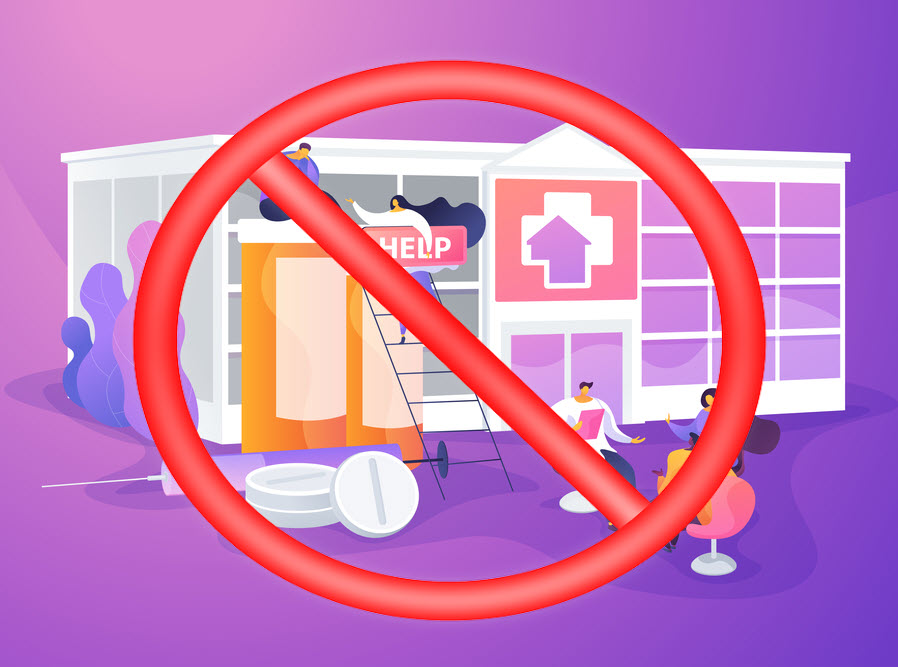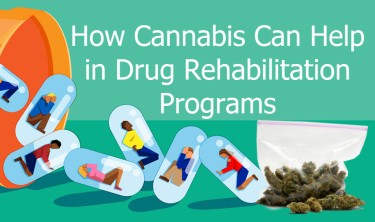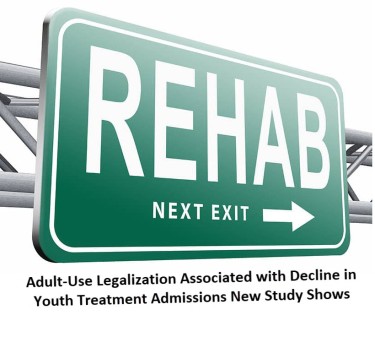
Legalizing cannabis isn’t increasing admission rates for drug rehabs, a new study says
I feel like I got a gift from the internet gods this week. Why? Once again, another cannabis myth has been busted by science, and perhaps as the scientific work continues to shatter the feeble lies of prohibition, we will finally break free from this repressive policy.
In today’s article, we take a closer look at adult cannabis use and admission to substance abuse treatment centers after legalization.
A recent study found that there was virtually no difference before and after legalization, meaning that “if you make it more accessible, more people will get hooked!” Myth is proven to be false. Of course, that doesn’t mean that there aren’t people who are addicted to cannabis – it simply means that the people seeking help to kick the habit haven’t changed.
People who have a problem with cannabis still go to these centers to help them get rid of their addiction, but that doesn’t mean they are addicted “because of cannabis”. Most likely, they have an addictive personality or a deep inner need that isn’t being properly addressed, and cannabis is being used as a “soul patch” for the inner pains they’re suffering from.
Nonetheless, it’s good to see mainstream science going along with what cannabis activators have been clamoring for decades.
Before we continue, let’s take a closer look at what the study actually said;
Does legalization play a role in the fight against drug abuse?
The study, titled “Admissions to Substance Abuse Centers for Cannabis Use Disorders, 2000-2017: Does Legalization Matter?” This study examined whether there was a significant change in “admissions to substance abuse centers” over 17 years or not.
In the newspaper – accessible here – explained in its methods;
(so readers don’t email me where I got this stuff @_@ )
data from the Treatment Episode Record Approvals were used to study the relationship between Marijuana-related admissions among adults ≥ 18 years of age by year and legalization status (i.e. fully legalized, for medical use only [partially legalized]and illegal) (N=35,457,854). Using interaction analyses, we further examined whether certain patient characteristics were associated with being in states that legalized marijuana use versus those where marijuana remained illegal.
In other words, the researchers compared data in different legalization categorizations. From fully banned to fully legalized, they analyzed a population of approximately 35.5 million people in the United States living under these conditions.
In their results section they wrote;
Overall, the proportion of marijuana-related shots in states with Legalization down 2.3% from 31.7% in 2000-2005 to 29.4% in 2012-2017 (odds ratio [OR], 0.90; 95% confidence interval [CI]0.89-0.90) with little difference from states where marijuana use remained illegal, in which use of marijuana as a reason for admission decreased by 0.3% from 39.8% in 2000-2005 to 39.5% in 2012-2017 (OR, 0.99; 95% CI, 0 .98-0.99). We found no prominent patient characteristics (e.g., police referral) associated with admissions to states that had legalized compared to those that had not.
In other words, since legalization, admissions have declined. Does this mean that fewer people are struggling with marijuana addiction after legalization, or does it indicate “fuzzy numbers” that are the result of political maneuvering gaining prominence because of drug policies?
As one Reddit user commented;
I mean, probably because no one gets treated for marijuana abuse unless ordered by the court…
Tato7069 – Reddit
This is exactly what happens in many cases when looking at drug abuse treatment approvals for cannabis. There are large numbers of people who would rather go to a “court-mandated treatment program” for weed than serve a prison sentence.
Think about it, it’s the lesser of two evils – but only for the person caught with weed. To the system as a whole, it is a money cow, producing “admission statistics” that justify its raison d’être. Given that many of these entities receive funding from the state or the Fed, maintaining the status quo is good for business.
But when it comes to legalization, they no longer have a valid reason to force anyone into rehab without their consent. Because when smoking weed is no longer a criminal offense, the courts can’t order anything…unless, of course, you commit a crime while smoking weed that the court can order you totally against your will.
Nonetheless, legalization has reduced annual attendance by about 2.3%, but interestingly, Prohibition states also saw a 0.3% drop in attendance. The difference seems so small that the title of the study makes sense…”Does legalization matter?”
If Heroin Was Legal Tomorrow… Would You Try It?
This is a question I often ask people who oppose drug legalization. They call me crazy for suggesting that we eliminate all drug-related crime and legalize all drugs, make them available to all adults and educate people about responsible use.
I even have a full rework on how to reduce the harm of drug use and essentially put all cartels out of business.
But first, I want to ask you, “If heroin were legal tomorrow…would you be using it?” What about crack? Crocodile? PCP?
In all likelihood, you’ve probably said no to most, if not all, of the medications I’ve mentioned. How about LSD? psilocybin? DMT?
Perhaps more of you raised your hand while others still avoided all drug use altogether. Do you see how you might make a rational decision to assess your own risk to a particular experience? This is something every single adult has the power to do…we do it every single day when we drive, when we use power tools, when we decide to go skydiving.
We assess the potential danger of a given situation and decide whether or not the risk is worth the reward. For most people, the idea of taking heroin, crack or PCP or fentanyl seems too risky, and while the rewards may be significant, the risk outweighs the rewards.
Here’s the twist – vice versa: the people who said, “If heroin were legal tomorrow, I would do it…” are probably already using heroin because their desire to use heroin is already there. dr Carl Hart takes small doses of heroin recreationally – and he claims not to be addicted.
He could be telling the truth. I wouldn’t know.
But what I do know is from personal experience, I’ve snorted quite a bit of cocaine at certain points in my life. I’ve thoroughly enjoyed myself on some of these trips… and by the time I was done with the experience I had no desire to consume any more any time soon.
The point I’m trying to make is that each individual understands their own risk-reward decision-making process and once they’ve decided that “using heroin” is worth the risk – a weak law would do very little about it discourage consuming it.
However, the question should be who decides what is good for you and what is bad for you? Physical autonomy means you have the right to consume whatever you want, even if it’s bad for you…you know…like alcohol and tobacco.
And we’ll leave it here for now… Do you think you have the ability to decide for yourself which experience is risky and which isn’t? Shouldn’t you be allowed to choose what you put into your body and what not?
If you don’t own your body? What are you then?
CANNABIS AND DRUG REHAB PROGRAMS, READ MORE..

HOW CANNABIS IS USED IN DRUG REHABILITATION CENTERS!
OR..

CANNABIS USE IN ADOLESCENTS AND REHAB RATES, WHY IT HELPS!

Post a comment: